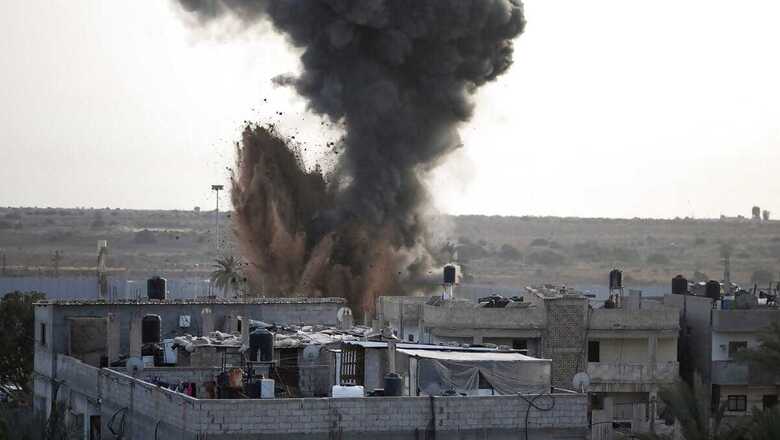
views
Israel said Wednesday its forces were carrying out “offensive action” in Lebanon after launching cross-border strikes targeting Hamas ally Hezbollah as Israeli aircraft and tanks pounded the Gaza Strip.
Since the Israel-Hamas war erupted on October 7, Lebanon’s powerful Iran-backed Hezbollah group and Israeli forces have traded near-daily fire, heightening fears of a wider conflict breaking out.
In war-battered Gaza, there has been mounting concern over Israeli plans to launch an assault on the southern Gazan city of Rafah, where 1.5 million people have sought refuge, many in makeshift encampments.
Aid groups warn any invasion would create catastrophic conditions for civilians. However government spokesman David Mencer said Israel was “moving ahead” with its operation in Rafah, which Israeli officials have described as the “last” major Hamas stronghold where militants may be holding hostages.
Hamas meanwhile released a video of an Israeli-American man who was one of the 129 hostages Israel estimates remain in Gaza, a figure that includes 34 presumed dead.
Also on Wednesday, US President Joe Biden signed a bill authorising $13 billion in military aid to close ally Israel.
The bill also included $1 billion in humanitarian aid for Gaza, which Biden demanded Israel allow reach Palestinians “without delay”.
Middle East tensions remain high more than 200 days into the devastating war, which has also seen rising violence between Israel and Iran’s proxies and allies in the region.
Defence Minister Yoav Gallant said that “many forces are deployed” along Israel’s northern border, claiming the military has eliminated “half of Hezbollah’s commanders in southern Lebanon” over months of violence.
Israel has struck increasingly deeper into Lebanon, while Hezbollah has stepped up rocket fire and drone attacks on Israeli military bases across the border.
“IDF (military) forces are currently carrying out offensive action throughout southern Lebanon”, Gallant said, without specifying whether ground troops had crossed the border.
A spokesman for the United Nations peacekeeping force, UNIFIL, told AFP that “we didn’t detect any ground crossing today.”
The Israeli army had earlier said its forces struck around 40 Hezbollah targets in southern Lebanon, with Lebanese official media reporting at least 13 strikes on several villages.
No safe place
Earlier Wednesday, hospital and security sources in Gaza reported Israeli air strikes in Rafah as well as the central Nuseirat refugee camp.
Israeli Prime Minister Benjamin Netanyahu has repeatedly insisted the assault on Rafah will go ahead, despite strong opposition from humanitarian groups and countries including the US.
Government spokesman Mencer said “Israel is moving ahead with our operation to target Hamas in Rafah”, without providing a timeline.
Citing Egyptian officials briefed on the Israeli plans, the Wall Street Journal has said Israel was planning to move civilians to nearby Khan Yunis over a period of two to three weeks, before gradually sending in troops.
“There is no safe place in all of Gaza except for this area here,” displaced Palestinian man Samer Felfel told AFP at a makeshift displacement camp near the territory’s border with Egypt.
If Israeli troops enter Rafah, “there will be no safe place left”, he added.
The war began with an unprecedented Hamas attack on October 7 that resulted in the deaths of around 1,170 people, according to an AFP tally of Israeli official figures.
In retaliation, Israel launched a military offensive that has killed at least 34,262 people in Gaza, mostly women and children, according to the Hamas-run territory’s health ministry.
The hostage in the video released by Hamas identified himself as Hersh Goldberg-Polin, a 23-year-old Israeli-American man who was among those abducted from the Nova music festival on October 7.
In the video, the authenticity of which AFP has not been able to independently verify, Goldberg-Polin was missing a hand, a wound he suffered during his capture.
In an apparent reference to Jewish Passover, which began this week, Goldberg-Polin told Israeli government members that “while you sit and have holiday meals with your families, think of us, the hostages, who are still here in hell”.
His parents Rachel Goldberg-Polin and Jon Polin said they were “relieved to see him alive”.
“But we are also concerned about his health and wellbeing as well as that of all the other hostages and all of those suffering in this region,” they said in a statement.
Hospital bodies
The European Union, the UN rights office and most recently the White House have called for a probe into reports of mass graves found at the Gaza Strip’s two biggest hospitals after Israeli raids.
“We want answers,” US National Security Advisor Jake Sullivan said on Wednesday. “We want to see this thoroughly and transparently investigated,” he added.
Israel has repeatedly targeted hospitals during the war, accusing Hamas of using them as command centres and to hold hostages abducted on October 7. Hamas denies the accusations.
Gaza’s Civil Defence agency said nearly 340 bodies were uncovered at the Nasser Hospital in the southern city of Khan Yunis.
Israeli army spokesman Major Nadav Shoshani said on X that “the grave in question was dug — by Gazans — a few months ago.”
The Israeli army did acknowledge that “corpses buried by Palestinians” had been examined by soldiers searching for hostages, but did not directly address allegations that Israeli troops were behind the killings.
Relatives of missing Palestinians have been arriving at Nasser Hospital in search of their loved.
Some told AFP the bodies recovered had been buried by relatives.
Reem Zidan said her “maternal instinct” led her to her son Nabil’s body.
“They told me to move away, but I said, ‘my son is on the bulldozer’,” the 42-year-old told AFP.
“I haven’t seen him for three months, and today I found him”, she said, adding that Nabil was killed by shrapnel from an Israeli air strike.




















Comments
0 comment